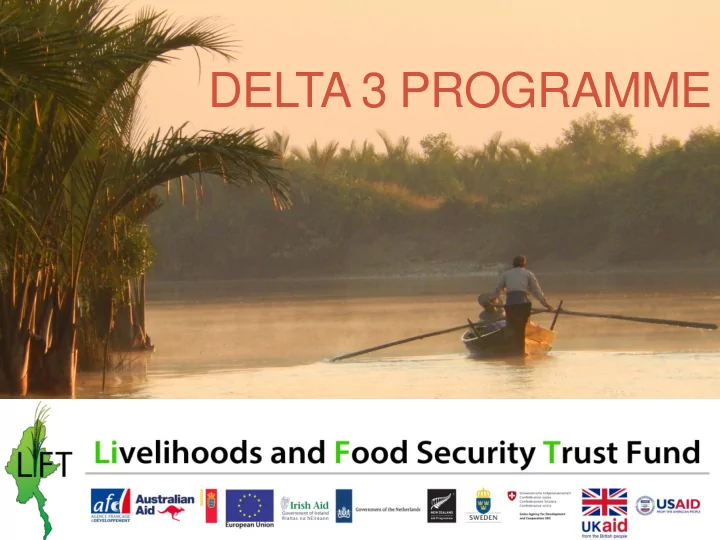

DELTA 3 PROGRAMME
Content • Background of the programme • Definition of the four components • Geographical coverage • Budget and phasing • Timeframe
Background • Delta 1: Post-emergency [2010] • Delta 2: Development oriented programme [2011-15] • Workshop on the Delta 2 Lessons learned with contribution from all IPs (more on LIFT website) • LIFT new strategy [2014-2018]
Four components • Component 1: To strengthen the smallholder farmer position in the rice value chain (Step up) • Component 2: Access to new economic opportunities for landless/poor households: off-farm income generation, vocational training and support for migration (Stepping out… and up ) • Component 3: Addressing household and community vulnerabilities: improved nutrition, social protection and reduced indebtedness (Hanging in) • Component 4: Support to pro-poor policies and stakeholder coordination
Component 1: Rice value chain • Target smallholders with commercial potential for stepping up • Integrated quality seed supply • Extension and farm advisory services • Post-harvest management, storage and marketing • Farmer organisations • Rural finance
Component 2: Off-farm income generation • Target landless and poor households without potential to scale up agricultural activities, but capacity for stepping out • Investment in off-farm livelihood activities (rural finance, training) • Migration related supports • Aquaculture and small fisheries
Component 3: Nutrition and social protection • Target vulnerable households within their communities to improve resilience (hanging in) • Nutrition and WASH • Vulnerability mapping and action plans • Social protection, direct cash transfers • Debt management
Component 4: Pro-poor policies • Crosscutting component • Knowledge management • Stakeholder coordination • Capacity building for CSO • Local governance • Secure land tenure
Geographical coverage • 4 townships: • Pyapon, Bogale, Mawlamyinegyun, Laputta • Rationale: • Similar to Delta 2 coverage • Highest poverty score (WFP) • Still important scale-up opportunities • Population in rural areas: • ~ 1.1 million people • ~ 270,000 households • ~ 2,200 villages • 66% landless
Budget & phasing • Overall budget $ 30 M with a tentative allocation in seven “packages” • Rolled out in three phases: Phase 1: Calls for financial services and for services across all four components Phase 2: Complementary services based on further studies (migration, fisheries, land) and identified gaps (small grant for local CSOs) Phase 3: Additional services identified during implementation, scale up successful experiences
Delta 3 Programme Framework 1. Increased 2. Improved 3. Increased 4. Increased 5. Improved diets 6. Safeguarded 7. Strengthened 8.Generation of sustainable market access employment in access to of women and access to & local capacity to policy-relevant LIFT Outputs (national) agricultural and market non-farm affordable children. sustainable use of support and evidence production by terms for small activities for financial services natural resources promote food and regarding small small holder holder farmers. small holders by small holders for smallholders livelihoods holder farmers farmers. and landless. and landless. and landless. security. and landless. Addressing vulnerabilities: improved nutrition, social Strengthen the smallholder farmer position Access to new off-farm economic opportunities for Priorities in protection, reduced indebtedness and higher land tenure landless/poor households (Stepping out… and up) in the rice value chain (Stepping up) the Delta security (Hanging in). 1. Diversified rural finance 2. Agricultural services through 6. Integrated seed 3. Off-farm livelihood 5. Coordination and services ($8m) : collective systems ($7m) value chain ($4m) opportunities ($3m) governance support Implementation “packages” • Expand existing pro-poor • Extension services to farmers • Integrated seed supply • Start-up capital ($1m) services (MFIs) through public, private service between gov’t and • Vocational and business training • Support IPs and • New financing for small scale ag providers private/seed-growers • Financial services (package 1) stakeholders’ technologies, esp. water & • Support seed-growers • Facilitate private sector coordination mechanisation organisations at township leveI branding, marketing and • Support to local 4. Community-based Social • Finance for private ag. services, • Advisory services for farm distribution protection, Nutrition and WASH governance SME and farmer management • Support to land conflict ($3m) organisations/coops (storage • Technical, managerial and 7. Complementary • Support for local social protection resolution mechanisms systems, inventory credit) institutional support to farmer supports ($4m) systems • Finance for off-farm livelihoods organizations • Support to migrants • Nutrition education & CCTs for • New financing for social • Post-harvest platforms, collective • Support to the fishery improved infant and young child protection (IDAs) marketing value chain feeding • TA for institutional sustainability • Small grants window • WASH infrastructure of MFIs for local CSOs • Debt relief activities Phase 1 ($22m): Phase 2 ($8m): Timing of contracting 1. Call for proposals on rural finance (1) in Q2 2015 ($8m) 1. Call for proposals on integrated seed value chain (6) in Q4 2015 ($4m) 2. Call for proposals on agricultural services (2), off-farm livelihood (3) and social 2. Call for proposals on migration and other complementary support (7) in Q4 protection (4) and governance (5) together in Q2 2015 ($14m) 2015 ($3.5m) 3. Design and contract the following studies: 3. Launching of small grants window and support to local CSO (7) in Q4 2015 • Study the Seed Supply system and seed demand in the Delta ($0.5m) Study the institutional framework for farmer economic associations, • cooperatives and farmer unions
Time frame for phase 1 February and March 2015 Consultations with partners and government Early March Call for Concept Notes Selection / approval of CNs to be developed into full April proposals June Full proposal submission, proposal review July - August Proposal approval, negotiation and contracting September IP team mobilisation
Comments and questions are welcome
Recommend
More recommend